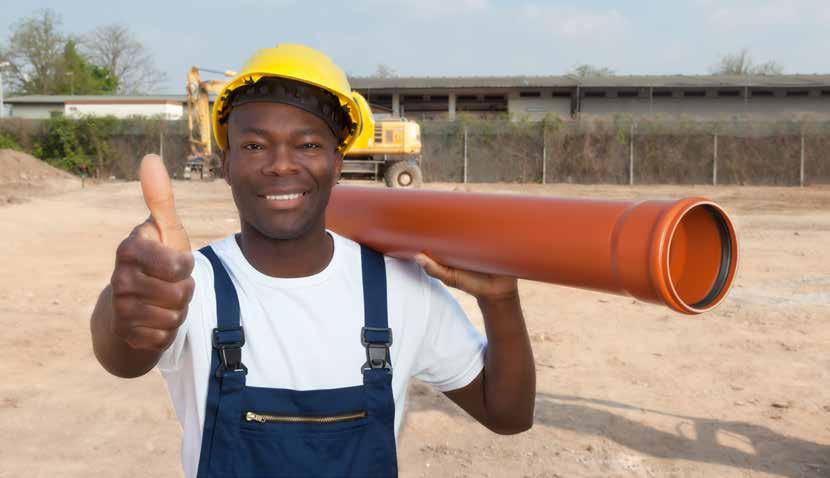
4 minute read
Chair’s comment
Towards a multifaceted approach
South Africa remains a world leader in water technology, knowledge and innovation. We have no shortage of technical solutions. And yet, the 2019 Global Innovation Index identified infrastructure as one of South Africa’s key weaknesses.
Advertisement
By Dan Naidoo
Water industry professionals are well aware that South Africa’s water infrastructure is declining in terms of functionality, efficiency and meeting the needs of all. The most recent SAICE Infrastructure Report Card awarded South Africa a D- for bulk water resources, a C+ for supply in major urban areas, and a D- supply for all other areas. Once globally revered, South Africa’s water and sanitation sector now faces challenges of insufficient maintenance,

funding shortfalls, loss of skills, major project delays, rising non-revenue water levels, declining water quality, and a discontinuation of effective monitoring, such as through the Blue and Green Drop reports.
All this while over 3 million people still do not have access to a basic water supply service and 14.1 million people are without access to safe sanitation.
It is clear that the problem does not lie in the technical solutions, of which there are no shortage, but rather in the implementation thereof. We must broaden the discourse in the sector to explore the economic, political and behavioural aspects that govern water and sanitation if we are to implement effective and sustainable solutions.
The economics of it all The Covid-19 pandemic has placed economics at centre stage. While nonpayment has long been a challenge, the pandemic and resultant lockdown have exacerbated this growing problem.
The capex and opex needed to address South Africa’s water and sanitation challenges run into the billions. But the economic impacts of the Covid-19 pandemic and resultant increase in nonpayment have decimated our municipalities. The drop in income amounts to billions of rand and many of our municipalities, including the metros, find themselves in dire financial circumstances that place future investments in the sector at significant risk.
The most recent Auditor-General (AG) report highlights a growing trend of established businesses across the value chain showing signs of a diminishing ability to pay for services, or completely refusing to pay. Individuals and households feel the same pressures and are similarly not forthcoming with payments.
Added to this, the report paints a bleak picture of the way billions of rand allocated to municipalities are being managed. In fact, the AG describes it as “contrary to the prescripts and recognised accounting disciplines.”
Revenue management and enhancement is absolutely crucial moving forward. And unfortunately, this
is not only up the financial experts, but to the technical experts as well. The technical experts need to change the way they think and find new ways of solving problems. This requires understanding the financial, as well as political, issues facing our municipalities.
If we do not enhance revenue, we will not be able to get the financing required to implement the technical solutions – no one is prepared to invest in a project that does not offer a return on investment.
Addressing consumer behaviour In addressing revenue enhancement, it becomes critical to address consumer behaviour. I would encourage our engineers and scientists to start engaging their counterparts in the finance and customer service departments to start having a conversation with residents.
Many of the bigger metros are now looking at introducing smart city projects. By embracing the digital revolution and building digital utilities, we can begin to share more information with citizens in order to facilitate behaviour change. If consumers can be empowered to understand their water consumption (good or bad) and the associated costs, we may start to see a positive change.
And this extends beyond payment for water consumption – an important topic as demand increasingly outstrips supply. We have approached this as a demand programme for the past few decades and it is not getting us anywhere; the numbers are not going in the right direction. Instead, we should look at implementing small-scale projects among certain LSM groups to promote behavioural changes, among the other initiatives.
The current pandemic has shown us the importance of sharing data. We must emulate this in the water sector and become more transparent with our data and share it in a meaningful way.
And this needs to extend beyond water to the elephant in the room
– sanitation. Sanitation is still a major issue in South Africa and deserves equal attention.
While we must accept that we do not have all the answers, we must also acknowledge that the current approach is not working. We need to join all the dots between resiliency, climate change, digitisation and finance – together with the work we do in our sector – to add up to the same end game.
If we begin to look at the problem from a new angle, we can start a new conversation and work towards a meaningful solution.










